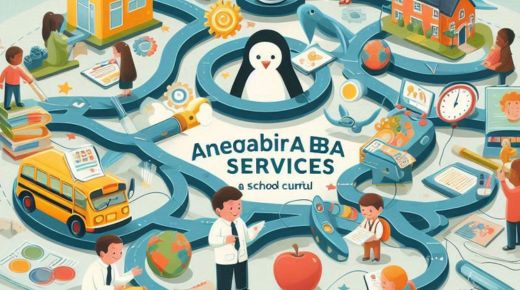The Advantages of Early Intervention: Commencing ABA Services at a Stage

Intervention plays a crucial role in aiding children with autism spectrum disorder (ASD) and other developmental delays. Introducing services, such as Applied Behavior Analysis (ABA), at a stage can significantly positively affect a child’s development. This section will delve into the benefits associated with intervention, highlighting how initiating ABA services early can improve outcomes across different aspects of a child’s growth and learning.
Understanding Applied Behavior Analysis (ABA)
Applied Behavior Analysis (ABA) is a research-backed method focusing on comprehending and enhancing behaviors. By utilizing techniques rooted in behaviorism principles, ABA therapists can assist children in acquiring skills and minimizing behaviors. The focus lies on measurable behaviors, enabling evaluation and monitoring of progress. Early intervention through ABA aims to ensure compliance and equip children with the necessary skills for successful interactions in everyday scenarios.
Significance of Critical Developmental Periods
One compelling reason to commence autism treatment options early is the concept of periods. Studies indicate that the brain is most receptive to learning during the years of a child’s life. During this stage, the brain refines connections based on experiences. Through structured and positive learning activities using ABA, parents, and therapists can significantly improve children’s social and emotional abilities.
Improving Communication Skills
Communication can be a struggle for children with ASD. Early ABA intervention enhances nonverbal communication skills. Tailored programs address each child’s needs using techniques like peer modeling, narratives, and communication aids. Developing these communication skills can lead to greater independence and better interactions with peers and adults.
Encouraging Social Interaction
Social skills are essential for integration into school environments and the broader community. ABA services often include training in skills to help children engage with others, share, and show empathy. Early intervention promotes improved understanding and reduces anxiety related to social situations. By providing practice opportunities, children become more adept at social interactions.
Addressing Challenging Behaviors
Some children with ASD may display behaviors like meltdowns or aggression due to frustration or difficulties in expressing themselves. Beginning ABA therapy early can help understand and address the root causes of issues. Using methods like reinforcement and practical communication training, early intervention can mitigate these challenges, creating a peaceful home and school environment.
Supporting Family Dynamics
The positive effects of ABA intervention go beyond the child. Extend to the whole family unit. Early training and therapy provide parents with tools and strategies to aid their child’s development efficiently. Enhancing understanding of their child’s needs boosts confidence. Reduces stress within the family dynamic. Many families also find community by connecting with support groups and other parents who are facing hurdles.
Academic Achievement
Studies suggest that children who undergo ABA services are more likely to excel. By imparting learning and social skills at a young age, children can adjust better to formal education settings. Early intervention lays the groundwork for abilities, fostering a passion for learning, leading to improved educational outcomes and decreased reliance on special education services later on.
Long Term Results
The advantages of intervention can have enduring effects throughout a child’s lifetime. Research suggests that children receiving ABA therapy before age five enhance social skills, academic performance, and family bonds. These early advancements can result in improved quality of life, increased adult independence, and decreased reliance on support services later.
Promoting Independence
ABA intervention aims to encourage independence in children with ASD. By teaching them daily life skills like self-care routines, meal preparation, and personal hygiene, ABA services prepare them for adulthood. Through therapy sessions, children learn to navigate their surroundings, make decisions, and handle responsibilities confidently. Fostering a sense of autonomy does not boost self-confidence. It also empowers children to engage in their own lives actively.
Customized Intervention Approaches
Each child is unique, and early ABA services are tailored to suit needs and learning styles, ensuring that strategies are aligned with each child’s requirements. Initial assessments help create an intervention plan to identify the child’s strengths, weaknesses, and interests. This customized approach allows therapists to adapt techniques and goals as the child progresses, ensuring participation and facilitating learning. The partnership between families and therapists is crucial for maintaining a dialogue that supports outcomes over time.
Transitioning to School
As children with ASD get ready for school, getting early ABA intervention sets a foundation for a transition into educational settings. The skills learned during therapy can make adjusting to school environments, where they face interactions and structured learning easier. Additionally, by focusing on self-regulation strategies and social skills, children can learn how to adapt to the school setting, participate in group activities, and follow routines— elements for a successful educational journey.
Impact on Mental well-being
Early ABA services benefit not only a child’s progress but also their mental health. Addressing issues can help reduce anxiety and depression that some children may feel due to challenges in socializing or communicating effectively. With improved abilities to express emotions and engage with others, children often see an improvement in their overall wellness. Moreover, as families become better equipped to handle difficulties, the resulting decrease in family stress can impact the health of all family members.
Encouraging Parental Engagement
Involving parents in the ABA therapy process is essential for the success of intervention programs. Training sessions that teach parents methods enable them to practice skills and techniques at home, promoting consistency in the child’s learning environment. This collaborative approach strengthens the bond between parent and child and fosters a supportive setting where the child feels secure and understood. Parental engagement can boost motivation. Offer children a support system to navigate their growth journey.
Ongoing Evaluation and Progress Tracking
A crucial aspect of intervention involves continuously assessing and monitoring a child’s progress. Regular assessments help therapists gauge the impact of implemented strategies and make adjustments to ensure the intervention remains relevant and successful. These evaluations offer insights into the child’s progress, aiding in setting goals and celebrating milestones regardless of size. Consistent monitoring allows families to stay focused on long-term objectives while adapting to obstacles.
Closing Thoughts
Intervention benefits through Move Up ABA services are substantial and diverse. The potential for improved outcomes through enhanced communication skills, reduced challenging behaviors, and increased academic achievement highlights the significance of initiating these services at a stage. For families navigating the complexities of Autism Spectrum Disorder, embracing intervention can provide support essential for their children’s well-being.
Supporting the importance of detection and intervention sets the stage for a future for many children and their families. It’s always possible to begin ABA services and bring about changes in a child’s life. Over time, with effort, the advantages of ABA therapy can be observed at any age, proving to be a resource for individuals with ASD throughout their lifetime. In essence, early intervention through ABA provides hope and assistance to children with ASD and their families, establishing a foundation for a tomorrow.
Let’s persevere in raising awareness and advocating for intervention so that every child with ASD can realize their potential. Whether you’re a parent or caregiver seeking assistance for your child or an individual with ASD aiming to enhance aspects of your life, consider exploring ABA therapy as an intervention option for lasting positive results. Let’s continue spreading messages of hope and empowerment through ABA intervention. Together, we can impact the lives of individuals with ASD and their families.




